Introduction
Business credit cards work just like other credit cards. The only exception is that these business credit cards are used for business expenses alone. While the purpose of using these cards remains the same, business cards are offered in several categories. These categories include travel, utility, rewards, etc.
Business cards allow employees to cover business purchases, make purchases on behalf of their employers, and access funds easily without touching their personal funds or their personal credit score. Also, if you are self-employed, using a separate business card can take the pain out of reconciliations.
There are quite a few business credit card providers with numerous options. While this can be daunting, this article sheds light on the top 10 best credit cards for businesses in 2023. With a comparison table and a listing of these cards and their features, benefits, pros, and cons, you can decide on the best one for your organization.
List of 10 Best Business Credit Cards
- HDFC Infinia Credit Card
- HDFC Diners Club Black
- Kotak Corporate Gold Credit Card
- ICICI Bank Business Advantage Black Card
- AU Bank Business Cashback Rupay Credit Card
- American Express Platinum Corporate Card
- Axis Bank Executive Corporate Credit Card
- SBI Signature Corporate Card
- PAYTM HDFC Bank Select Business Credit Card
- AXIS Miles and More Credit Card
Please note that the fees mentioned here are indicative and subject to change. It’s always recommended to visit the official websites of the respective banks to get the most accurate and up-to-date information regarding the fees and features of these credit cards.
Suggested Read: TOP 10 Corporate Credit Card
Best Business Credit Cards Comparison
Credit Card |
Main Features |
Annual Fees (plus taxes) |
Joining Fee(plus taxes) |
Renewal Fee(plus taxes) |
HDFC Infinia Credit Card |
Premium rewards, concierge service, airport lounge access |
Varies based on credit limit |
₹10,000 |
₹10,000 |
HDFC Diners Club Black |
Dining and travel rewards, airport lounge access |
₹5,000 |
₹10,000 |
₹10,000 |
Kotak Corporate Gold Credit Card |
Corporate expense management, rewards program |
₹1000 |
Nil |
Nil |
ICICI Bank Business Advantage Black Card |
Business-oriented benefits, fuel surcharge waiver |
No annual fee for the first calendar year, ₹1,000 from the second year |
₹1,500 |
₹1,500 |
AU Bank Business Cashback Rupay Credit Card |
Cashback rewards on business expenses |
NA |
₹99 per month |
Nil |
American Express Platinum Corporate Card |
Premium rewards, airport lounge access |
Varies based on credit limit |
Nil |
₹29,000 |
Axis Bank Executive Corporate Credit Card |
Travel benefits, expense management tools |
₹3,500 |
₹3,500 |
₹3,500 |
SBI Signature Corporate Card |
Exclusive rewards, travel benefits |
Varies based on credit limit |
Nil |
₹499 |
PAYTM HDFC Bank Select Business Credit Card |
Cashback and reward points on business expenses |
NA |
₹1,000 |
₹1,000 |
AXIS Miles and More Credit Card |
Airline miles rewards, travel benefits |
Nil |
₹3,500 |
₹3,500 |
Best Business Credit Cards – Detailed Explanation
1. HDFC Infinia Credit Card
Card Overview
The HDFC Infinia Credit Card is a premium card put together to cater to the needs of high-net-worth individuals and provides a host of exclusive benefits and privileges.
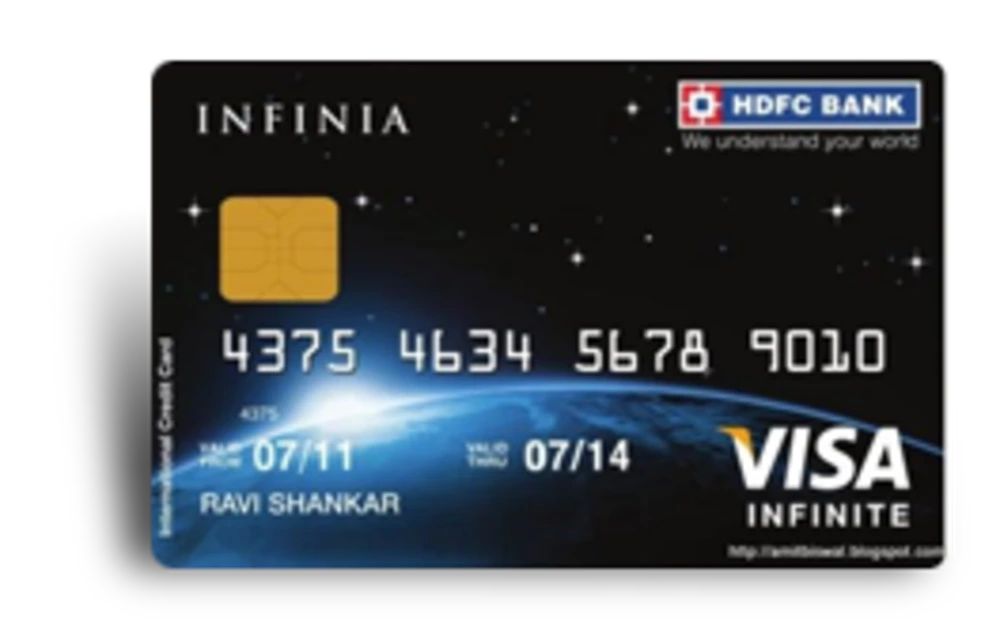
Features
- Metallic and unique card
- Premium rewards program with accelerated reward points on various spending categories.
- Airport lounge access at domestic and international airports is complimentary.
- Complimentary buffet and night stays at participating ITC hotels
- Primary card and add-on members get unlimited access to airport lounge services across the globe
- 5 reward points for every ₹ 150 spent.
Benefits
- Reward Points: Users can earn rewards (points) on every transaction and redeem them for numerous lifestyle and travel benefits.
- Travel Benefits: Airport lounges, travel insurance, flight, and hotel booking discounts offer a better experience.
- Lifestyle Privileges: Cardholders can avail of exclusive offers on dining, shopping, entertainment, and golf privileges.
- Concierge Service: you can access a dedicated concierge service for assistance with travel arrangements, reservations, and more.
Pros and Cons
Pros |
Cons |
|
HDFC Infinia has the highest base reward rate in the industry at 3.3%. |
On SmartBuy you can use only 70% of the booking amount against the points. |
|
You can get 3-10x reward points with the HDFC Infinia credit card on the HDFC SmartBuy portal. |
HDFC Infinia has been devalued several times. |
|
Unlimited lounge access in India and worldwide. |
The daily/monthly cap on accelerated awards. |
Pricing
You can sign up for The HDFC Infinia Credit Card after paying a joining fee of ₹10,000 and an annual fee of ₹10,000. These fees may be negotiable as they are typically based on the credit limit assigned to the cardholder.
Additionally, there may be charges for add-on business credit cards, late payment fees, and other miscellaneous charges. It is advisable to check the bank’s website for recent pricing information and to understand any insurance-related costs associated with the card.
Quick Read: 5 Best HDFC Corporate Credit Card Alternatives, Pricing and Review
2. HDFC Diners Club Black
Card Overview
The HDFC Diners Club Black business credit cards are a premium offering by HDFC Bank. The bank card is well-known for its exclusive benefits and privileges. The sleek black design of the card is popular and is recognized globally.
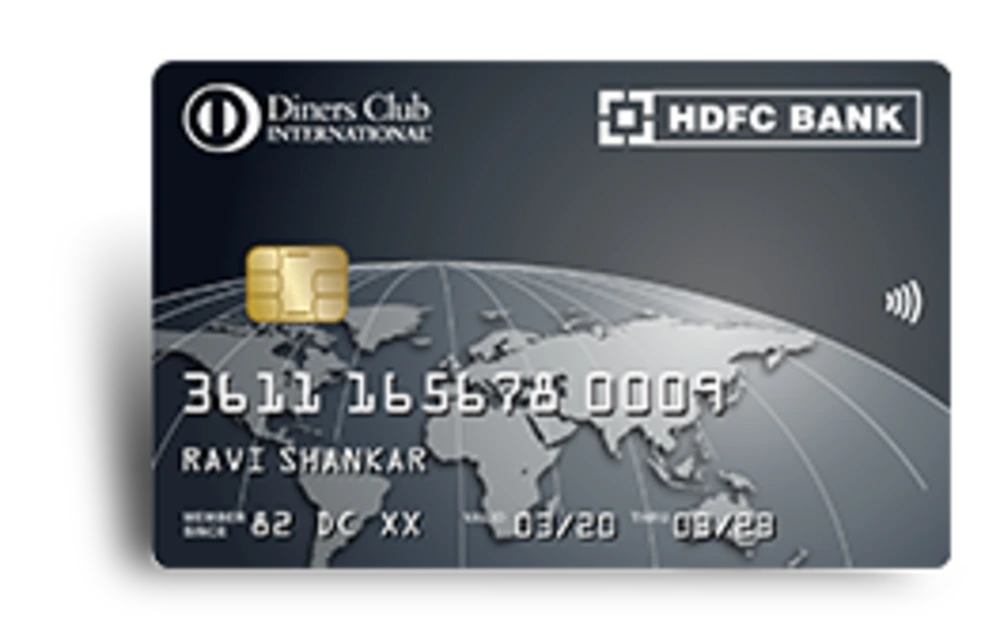
Features
- Premium rewards program with accelerated reward points on dining and international spending.
- Up to 10X reward points via SmartBuy and 2X on weekend dining
- Access to 1,000 + airport lounges worldwide through the Diners Club Lounge program.
- Complimentary games and lessons at select golf courses.
- Contactless payment technology for faster and more secure transactions.
- Complimentary Annual memberships of Club Marriott, Forbes, Amazon Prime, Swiggy One (3 months), MMT BLACK, and Times Prime
- Insurance coverage for travel, air accident, medical emergencies, and other benefits.
Benefits
- Reward Points: You can earn accelerated reward points on dining and international spending, with many options to redeem them including, flights, hotel bookings, merchandise, and more.
- Travel Benefits: using SmartBuy, you can book hotels or flight tickets across 150+ hotels and airlines (International and Domestic).
- Lounge Access: You can use the complimentary access to 1,000 plus airport lounges worldwide through the Diners Club Lounge program, making travel more comfortable and convenient.
- Golf Privileges: Avail complimentary games and lessons at certain golf courses in India and abroad, perfect for golf enthusiasts.
- Concierge Service: Access a dedicated concierge service for assistance with travel arrangements, reservations, and other lifestyle needs.
Pros and Cons
Pros |
Cons |
|
HDFC Diners Black credit card gives 2-10x accelerated reward points on SmartBuy portal purchases. |
The accelerated reward points are lower than what you get with the Infinia card. |
|
The milestone benefits of HDFC Diners Black are pretty straightforward. |
Dinerclub acceptance remains a point of concern for users. |
|
HDFC Diners Black offers 2x reward points on all dining spends every weekend |
Pricing
The HDFC Diners Club Black card is available at an annual fee of ₹5,000. There is a credit liability cover for ₹ 9 lakh, and you get up to 50 days of interest-free credit period on the card from the date of purchase. There is a 2% foreign currency markup on all foreign currency spends (please check the website for latest information on foreign transaction fees, if any).
Additional charges for add-on cards, late payment fees, and other miscellaneous charges may apply. Please consult the official website for accurate pricing information.
3. Kotak Corporate Gold Credit Card
Card Overview
The Kotak Corporate Gold Credit Card is designed for corporate clients offering many features and benefits tailored to meet their business needs. It is a reliable financial tool that helps manage corporate expenses efficiently while providing attractive rewards and privileges.
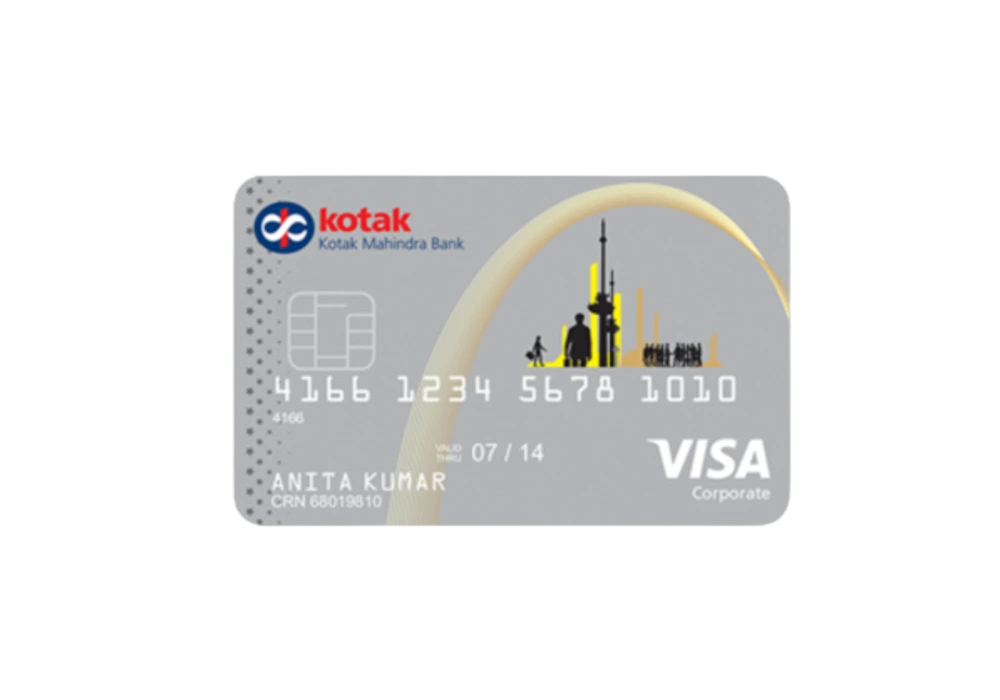
Features
- Expense Management: The card provides comprehensive expense management solutions, allowing businesses to track and manage their corporate expenses effectively.
- Rewards Program: Reward points earned on every eligible Kotak Corporate Gold Credit Card transaction can be redeemed against flights, hotel bookings, merchandise, etc.
- Add-on Cards: Businesses can request additional employee cards as add-ons, enabling them to track personal expenses while enjoying the benefits of the corporate credit facility.
- Contactless Payments: The card is equipped with contactless payment technology, providing a convenient and secure transaction method.
- Online Account Access: Businesses can access their credit card accounts online to view statements, make payments, and manage expenses easily.
Benefits
- Rewards and Redemption: Enjoy the benefits of a robust rewards program, earning reward points on eligible spends and redeeming them for various options.
- Dedicated Support: Benefit from a dedicated relationship manager who provides personalized assistance and resolves any queries or concerns related to the credit card.
- Fuel Surcharge Waiver: Enjoy a waiver on fuel surcharges at select fuel stations, helping businesses save on fuel expenses.
- Global Acceptance: The Kotak Corporate Gold Credit Card is widely accepted in India and internationally, allowing businesses to make payments conveniently during their domestic and overseas travels.
Pros and Cons
Pros |
Cons |
|
Comprehensive expense management solutions |
Limited rewards and benefits compared to some premium cards |
|
Fuel surcharge waiver |
Exclusive to corporate clients |
|
Dedicated support |
– |
Pricing
Just like other cards, these business credit cards come with its own set of fees and benefits. The joining and annual fee is nil. However, there is a monthly interest rate of 3.3% on this card, and you will also incur a foreign currency markup of 3.5% on the total transaction value.
For other and more current details on fees, make sure you check their website.
4. ICICI Bank Business Advantage Black Card
Card Overview
The ICICI Bank Business Advantage Black Card is a premium credit card specifically designed to cater to the financial needs of business owners and entrepreneurs. The features and benefits help businesses manage expenses and maximize savings. The card offers a combination of convenience, rewards, and financial flexibility, making it a valuable tool for business professionals.
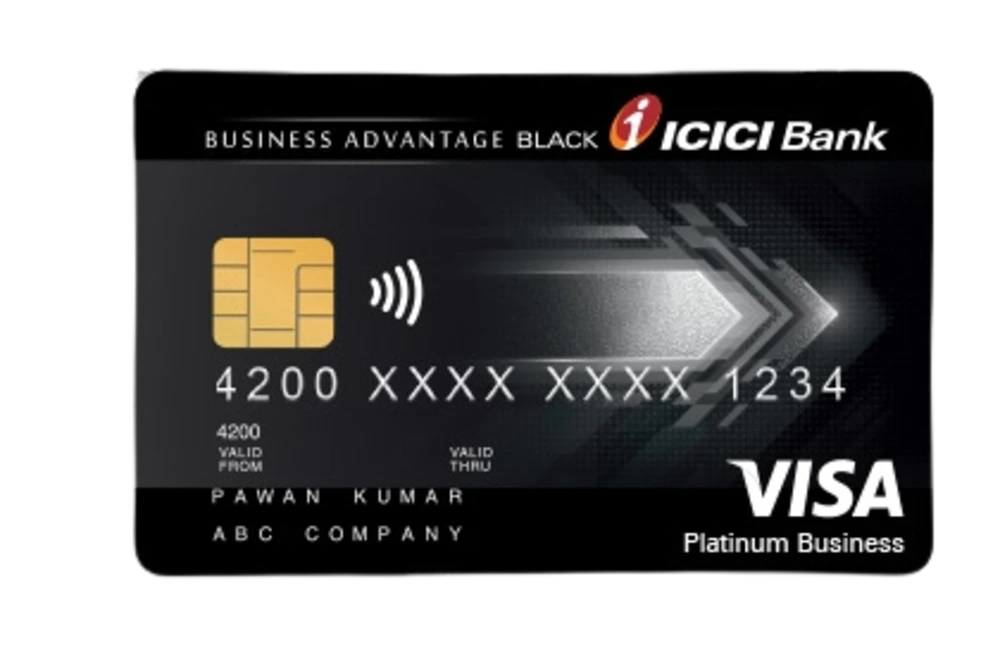
Features
- Business-oriented Benefits: The card is tailored to meet the requirements of enterprises, offering features like expense management, cash withdrawal facility, and high credit limits.
- Fuel Surcharge Waiver: Enjoy a fuel surcharge waiver at fuel stations across India, helping businesses save on fuel expenses.
- Contactless Payments: The card comes with contactless payment technology powered by Visa Payware, enabling quick and secure transactions at eligible retail merchants.
- High Credit Limit: The ICICI Bank Business Advantage Black Card provides a high credit limit, allowing businesses to meet their financial needs and manage expenses efficiently.
- Add-on Cards: Business owners can request add-on cards for their employees, enabling them to make purchases on behalf of the company while earning rewards.
Benefits
- Reward Points: Eligible transactions qualify for reward points, and they can be redeemed against flights, hotel bookings, merchandise, and more.
- Insurance: The card compensates you for business travel uncertainties. For instance, it offers personal air death insurance coverage for up to 75 lahks.
- Travel Benefits: The card offers complimentary airport lounge access, travel insurance, and discounts on flight and hotel bookings, making business travel more convenient and comfortable.
- Culinary treats: You can dine and get a minimum 15% discount on your dining bills. You can access a dedicated concierge service for assistance with travel bookings, reservations, and other lifestyle needs.
Pros and Cons
Pros |
Cons |
|
You can enjoy up to 48 days of interest-free credit on a Business Advantage Black Card for your business expenses. |
The annual fee is credited back to your account only if eligible spending is greater than ₹7,50,000 in an anniversary year or in the first year. Based on your renewal, this may change. |
|
Register yourself for standing instructions where every time the bill is due, automatic payment is made to the biller by ICICI Bank on your behalf. |
Limited acceptance at some merchants |
|
High credit limit |
Surcharge fuel waiver is only available on HPCL petrol pumps, surcharge waiver capped at ₹500 per month &₹5,000 per transaction on ICICI Bank swipe machines only. |
Pricing
The ICICI Bank Business Advantage Black Card comes with a joining fee of ₹1,500+ GST. Additional charges may apply for add-on cards, late payment fees, and other miscellaneous charges. Please consult the official website for accurate pricing information for these business credit cards.
Quick Read: 5 Best ICICI Corporate Credit Card Alternatives, Pricing & Reviews
5. AU Bank Business Cashback Credit Card
Card Overview
The AU Bank Business Cashback Rupay Credit Card is designed to offer cashback rewards and exclusive benefits for employees of an organization. This card provides a seamless and efficient way to manage business expenses while enjoying cashback benefits.
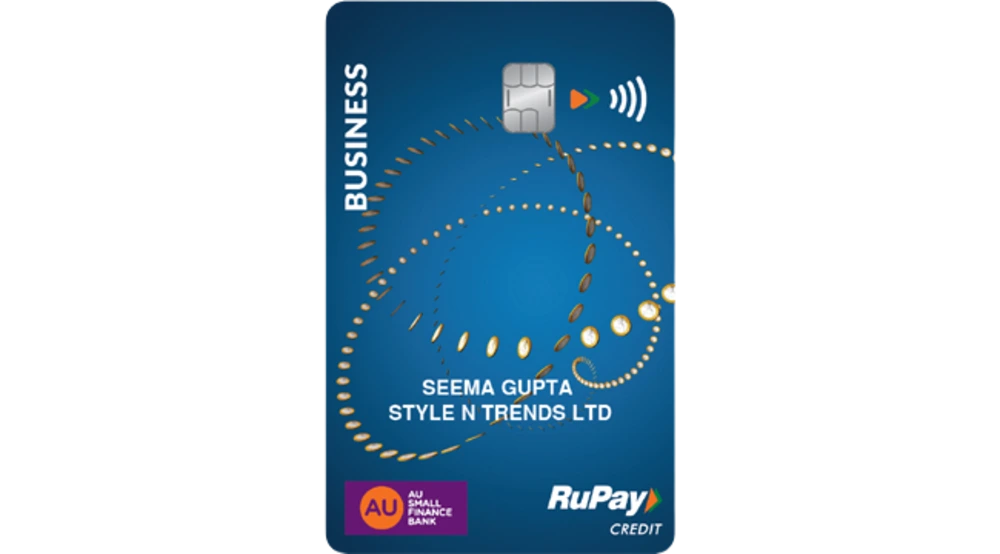
Features
- Cashback Rewards: Earn cashback on eligible transactions made with the AU Bank Business Cashback Rupay Credit Card. The cashback is credited to the cardholder’s account, providing savings on business expenses.
- Expense Management: The card offers tools and features to help businesses track and manage their expenses effectively, ensuring better financial control.
- Contactless Payments: Enjoy the convenience and security of contactless payments for faster and hassle-free transactions at eligible merchants.
- Add-on Cards: Business owners can request add-on cards for their employees, enabling them to make purchases on behalf of the company while earning cashback rewards.
- Fuel Surcharge Waiver: The card provides a fuel surcharge waiver at select fuel stations, offering savings on fuel expenses for business-related travel.
Benefits
- Cashback Rewards: Earn cashback on various categories such as dining, travel, fuel, and more, providing direct savings on business expenses.
- Expense Tracking: Efficiently manage business expenses with detailed statements and online access to track and monitor transactions.
- Fuel Surcharge Waiver: 1% fuel surcharge waiver for transactions done between ₹ 400 to ₹ 5,000 across all fuel stations in the country (Maximum ₹ 200 per statement cycle)
- Lounge: 8 complimentary lounge access per annum (maximum 2 per calendar quarter), using VISA/RuPay Card at railway stations.
Pros and Cons
Pros |
Cons |
|
Comprehensive protection cover |
Limited acceptance compared to other networks |
|
Expense management tools |
Limited information available on reviews |
|
Fuel surcharge waiver |
– |
Pricing
The monthly card membership fee is ₹ 99 per month+ applicable charges
The pricing and costs associated with the AU Bank Business Cashback Rupay Credit Card may vary. Please consult AU Small Finance Bank’s website for the latest pricing information regarding fees, charges, and any insurance-related costs associated with using the card.
6. American Express Platinum Corporate Card
Card Overview
The American Express Platinum Corporate Card is designed to provide exclusive benefits and privileges tailored to meet the unique needs of businesses and their employees. This card offers a range of features and services that enhance the corporate travel experience and provide comprehensive business support.
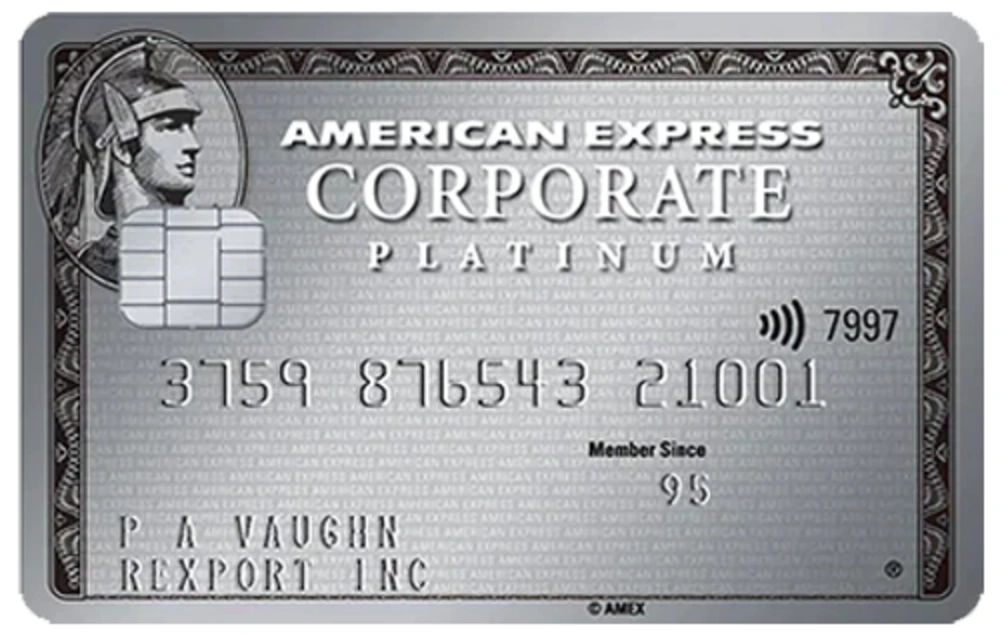
Features
- Global Acceptance: The American Express Platinum Corporate Card is widely accepted worldwide, making it convenient for businesses to use the card for expenses during domestic and international travel.
- Membership Rewards Program: Earn Membership bonus points on eligible purchases made with the card. These points can be redeemed for a variety of options, including flights, hotel stays, car rentals, and more.
- Travel Benefits: Enjoy complimentary access to airport lounges, travel insurance coverage, and preferential rates at select hotels, ensuring a comfortable and hassle-free travel experience.
- Expense Management Solutions: The card provides advanced tools and reporting features to help businesses track and manage expenses efficiently.
- Dedicated Customer Support: Benefit from dedicated customer support, available 24/7, to address any queries or concerns related to the card or account.
Benefits
- Membership Rewards: On joining, you get 5000 bonus rewards. You can earn Membership Rewards points on eligible purchases, providing opportunities to redeem them for various rewards, including travel, merchandise, and entertainment.
- Travel Privileges: Enjoy complimentary access to airport lounges, travel insurance coverage, and exclusive rates and benefits at partner hotels, enhancing the corporate travel experience.
- Culinary: You can avail 20% discount on dining bills at partnered restaurants.
- Lounge: you cand enjoy four complimentary lounge access privileges in India.
- Access advanced expense management solutions, including detailed reporting, online account access, and integration with expense management platforms, enabling efficient expense tracking and control.
- Dedicated Support: Receive personalized assistance from dedicated customer support, available round the clock, to address any card-related queries or concerns.
Pros and Cons
Pros |
Cons |
|
Global acceptance |
Lounge access is limited to four times alone. |
|
Taj Experience E-Gift card |
Limited acceptance at some merchants |
|
Membership Rewards program |
Exclusive to corporate clients. |
Pricing
There is a joining fee of ₹ 3,500 and a renewal fee ₹ 5,000 for American Express Platinum Corporate Card. However, this may vary based on the specific requirements and agreements with the corporate clients. Please consult the official website for accurate pricing information.
7. Axis Bank Executive Corporate Credit Card
Card Overview
The Axis Bank Executive Corporate Credit Card is tailored to provide exclusive benefits and privileges that cater to the lifestyle and business requirements of the cardholders. This card offers a combination of convenience, rewards, and financial flexibility, making it a valuable tool for corporate professionals.
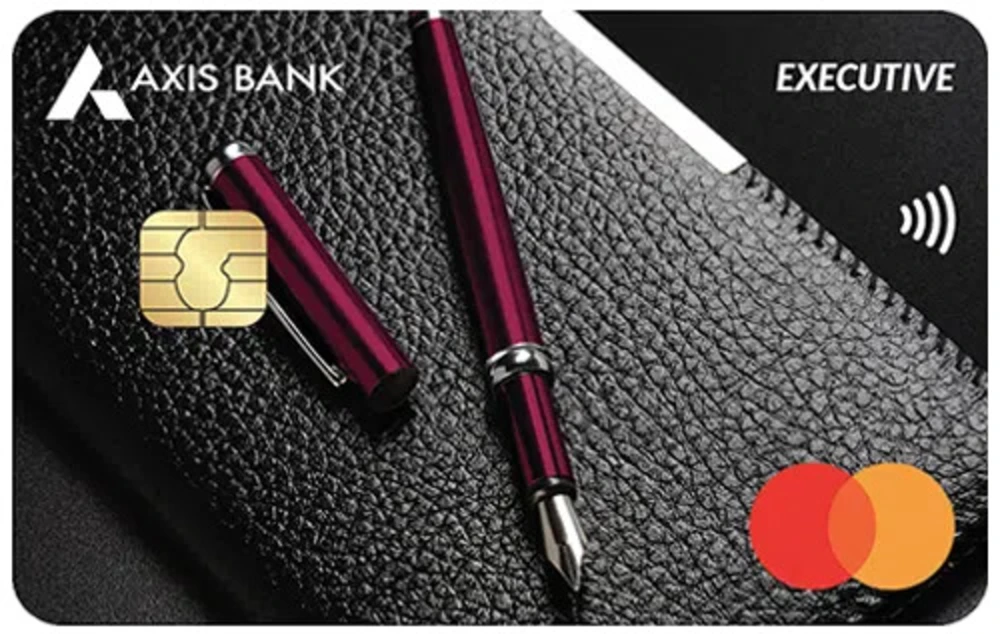
Features
- Personalized Credit Limit: The card provides a personalized credit limit based on the individual’s income and creditworthiness, ensuring financial flexibility.
- Expense Management: The card offers tools and features to help track and manage expenses effectively, allowing cardholders to have better control over their finances.
- Add-on Cards: Cardholders can request add-on cards for their family members, enabling them to enjoy the benefits and privileges of the Axis Bank Executive Corporate Credit Card.
- Contactless Payments: The card comes equipped with contactless payment technology, enabling quick and secure transactions at eligible merchants.
- EMI Conversion: Convert high-value transactions into easy monthly installments, providing convenience and flexibility in managing large expenses.
Benefits
- Rewards Program: Earn reward points on eligible transactions made with the Axis Bank Executive Corporate Credit Card. These points can be redeemed for a variety of options, including flights, hotel bookings, merchandise, and more.
- Lifestyle Privileges: Enjoy exclusive lifestyle benefits, such as discounts on dining, shopping, entertainment, and travel, enhancing the overall lifestyle experience.
- Concierge Service: You can enjoy 3 complimentary VIP assistance services in a year.
- Fuel Surcharge Waiver: Enjoy a waiver on fuel surcharges at select fuel stations, helping cardholders save on fuel expenses.
Pros and Cons
Pros |
Cons |
|
Personalized credit limit |
In India, contactless mode payment is allowed for a maximum of ₹ 5,000 |
|
Comprehensive protection with a range of insurance covers for travel and medical emergencies. |
Exclusive to corporate professionals |
|
Lifestyle privileges |
– |
Pricing
The joining and annual fees are ₹3,500, and the cash limit is 30% of the overall credit limit. Ultimately, pricing and costs associated with the card may vary based on the individual’s credit profile and the specific agreements with Axis Bank. Please consult the official website for accurate pricing information.
8. SBI Signature Corporate Card
Card Overview
The SBI Signature Corporate Card is a premium offering provided by State Bank of India (SBI) to cater to the financial needs of corporate clients. It is designed to provide exclusive benefits and privileges to cardholders, offering a seamless experience for managing corporate expenses and enhancing the overall business lifestyle. This card combines convenience, rewards, and financial flexibility to meet the requirements of corporate professionals.
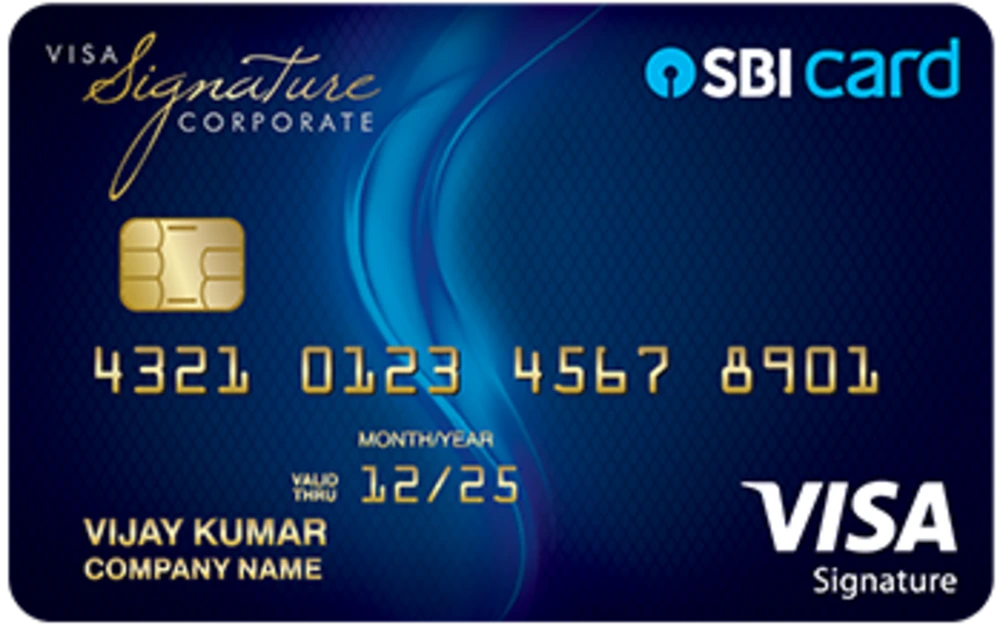
Features
- High Credit Limit: The SBI Signature Corporate Card provides a high credit limit, enabling cardholders to meet their business expenses and manage their finances effectively.
- Priority service: As an SBI Signature Corporate Card holder, you enjoy the highest level of services among all SBI card products.
- Priority pass: You can get a complimentary membership to the priority pass program worth $99. You can access more than 600 international airport lounges across the world.
- Global acceptance: You can use it across 38 million outlets worldwide, including 3 million outlets in India.
- Expense management: With the VISA Intellilink spend management tool, you can analyze spending patterns leading to better expense control.
Benefits
- Rewards Program: Earn reward points on eligible SBI Signature Corporate Card transactions. These points can be redeemed for a variety of options, including flights, hotel bookings, merchandise, and more.
- Travel Privileges: Enjoy exclusive travel benefits, such as complimentary airport lounge access, travel insurance coverage, and discounts on flight and hotel bookings.
- Lifestyle Benefits: Access lifestyle benefits, including discounts on dining, shopping, entertainment, and other selected categories, enhancing the overall corporate lifestyle experience.
- Fuel Surcharge Waiver: Enjoy a waiver on fuel surcharges at select fuel stations, helping cardholders save on fuel expenses for business-related travel.
Pros and Cons
Pros |
Cons |
|
High credit limit |
Limited acceptance at some merchants |
|
Comprehensive rewards program |
Exclusive to corporate clients |
|
Lifestyle and travel benefits |
– |
Pricing
The pricing and costs associated with the SBI Signature Corporate Card may vary based on the specific agreements and requirements with the corporate clients. Further, insurance cover for corporates is limited to ₹ 60 lakhs. Please consult the official website for accurate pricing information.
9. PAYTM HDFC Bank Select Business Credit Card
Card Overview
The PAYTM HDFC Bank Select Business Credit Card is a collaboration between PAYTM and HDFC Bank. It combines the convenience and flexibility of a credit card with the digital wallet features and benefits offered by PAYTM. This card provides seamless integration with PAYTM’s digital ecosystem, enabling businesses to manage their expenses, make payments, and enjoy exclusive benefits.
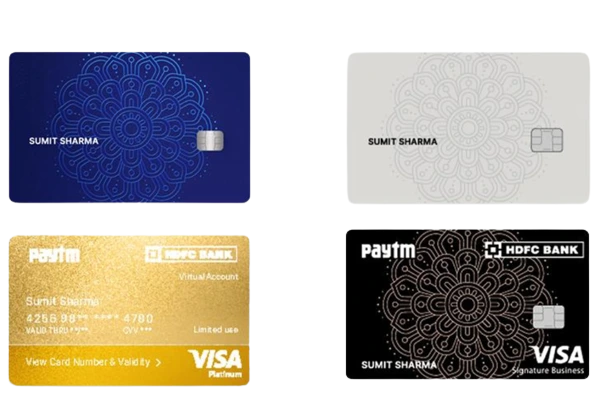
Features
- Digital Integration: The card is closely integrated with the PAYTM digital wallet platform, allowing users to make seamless payments, track expenses, and manage their business finances conveniently.
- Cashback Rewards: You can earn cashback on eligible transactions made with the PAYTM HDFC Bank Select Business Credit Card. The cashback is credited directly to the PAYTM wallet, providing savings on business expenses.
- Expense Management: The card offers tools and features for effective expense tracking and management, helping businesses maintain better control over their finances.
- Fuel Surcharge Waiver: The card provides a fuel surcharge waiver at select fuel stations, offering savings on fuel expenses for business-related travel.
Benefits
- Cashback Rewards: Earn cashback on various categories such as dining, travel, shopping, and more, providing direct savings on business expenses.
- Digital Integration: Seamlessly integrate with the PAYTM digital wallet platform, enabling convenient payment options, expense tracking, and financial management.
- Expense Management Tools: Access advanced tools and features to track and manage business expenses efficiently, ensuring better financial control.
- Fuel Surcharge Waiver: Enjoy a waiver on fuel surcharges at select fuel stations, providing cost savings on fuel expenses for business-related travel.
Pros and Cons
Pros |
Cons |
|
Digital integration with PAYTM |
Limited acceptance compared to other networks |
|
Cashback rewards on eligible transactions |
Exclusive to PAYTM users and HDFC Bank customers |
|
Expense management tools |
– |
Pricing
The pricing and costs associated with the PAYTM HDFC Bank Select Business Credit Card may vary. While the joining and renewal fees are mentioned, please consult the official website for accurate information on other fees and charges.
10. AXIS Miles and More Credit Card
Card Overview
The AXIS Miles and More Credit Card is a travel credit card offered by AXIS Bank in collaboration with the Miles and More loyalty program. It is designed for frequent travelers and aviation enthusiasts who want to earn rewards and benefits for travel-related expenses.
This card allows cardholders to earn miles and award miles on their card spends, which can be redeemed for flights, upgrades, hotel stays, and other travel-related rewards. With exclusive travel privileges and rewards, this card enhances the overall travel experience for cardholders.
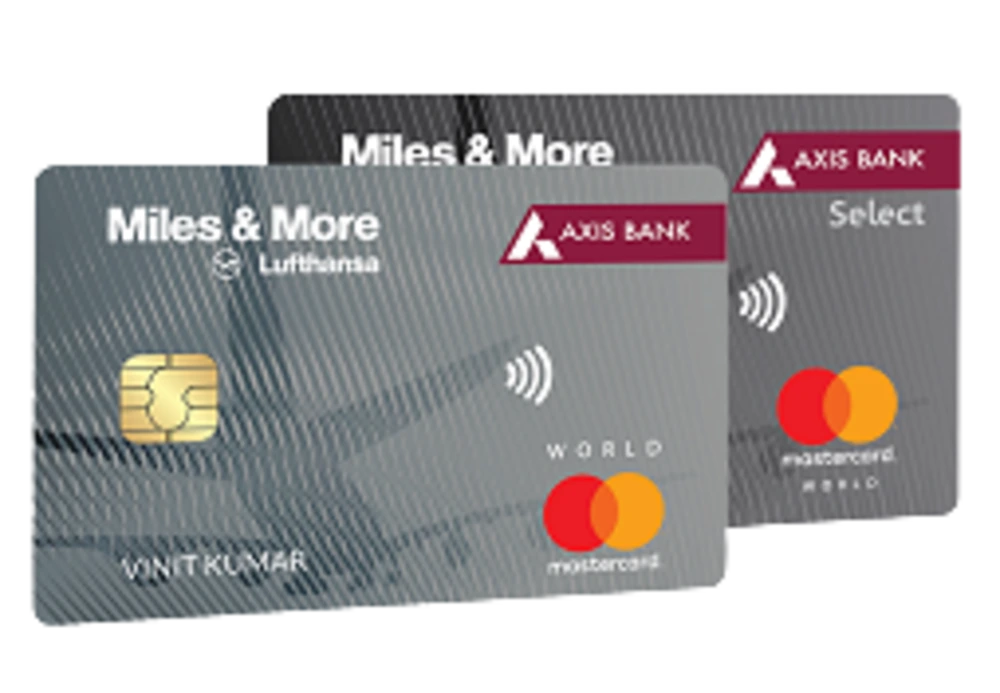
Features
- Miles Accumulation: You can earn miles on eligible transactions made with the AXIS Miles and More Credit Card. These miles can be accumulated and redeemed for flights, upgrades, and other travel-related rewards.
- Travel Benefits: you can get complimentary airport lounge access, preferential rates at partner hotels, and other travel-related privileges that enhance the overall travel experience.
- Contactless Payments: The card offers the convenience and security of contactless payments, allowing quick and hassle-free transactions at eligible merchants.
- Fuel Surcharge Waiver: You can avail of waivers on fuel surcharges at select fuel stations, providing savings on fuel expenses during the travel.
- Add-on Cards: Cardholders can request add-on cards for their family members, enabling them to earn miles on their card spending and enjoy travel benefits.
Benefits
- Miles Redemption: Redeem accumulated miles for flights, upgrades, hotel stays, car rentals, and other travel-related rewards, enhancing the value of your travel expenses.
- Travel Privileges: Enjoy complimentary access to airport lounges, preferential rates at partner hotels, and other travel-related privileges that enhance the overall travel experience.
- Fuel Surcharge Waiver: Avail a waiver on fuel surcharges at select fuel stations, providing cost savings on fuel expenses during the travel.
- Insurance Coverage: The card offers insurance coverage, including air accident cover and lost card liability cover, providing peace of mind during travel.
Pros and Cons
Pros |
Cons |
|
Earn miles on card spends |
Limited acceptance compared to other networks |
|
Exclusive travel benefits and privileges |
Exclusive to AXIS Bank customers |
|
Redemption options for flights and upgrades |
– |
Pricing
The pricing and costs associated with the AXIS Miles and More Credit Card may vary. While most pricing information is available online, such information may be dated. Please consult the official website for accurate pricing information.
Quick read: What are Business Travel Expenses: A Process Guide
What is a business credit card?
A business credit card is a financial tool designed for employees of any organization to provide a convenient and separate line of credit to cover various business-related expenses, such as office supplies, travel expenses, inventory purchases, and other operational costs. These credit cards offer several benefits and features tailored to meet the needs of an organization.
Business owners, entrepreneurs, and professionals across various industries utilize business cards. They are commonly used by small business owners, freelancers, sole proprietors, and even larger corporations. These credit cards help enterprises streamline their financial operations, improve cash flow management, and separate personal and business expenses.
Quick read: What are Business Travel Expenses: A Process Guide
Understanding the importance of business credit cards
1. Enhanced Expense Management
Business cards provide a streamlined way to manage expenses. They offer detailed monthly statements, categorize transactions, and provide digital tools to track and analyze spending. This simplifies record-keeping and makes it easier to monitor and control business expenditures.
2. Separation of Personal and Business Finances
Using personal credit cards for your expenses and a different one for business expenses is wise. The separation is crucial for accurate accounting, tax reporting, and maintaining the legal distinction between the business and its owner. It saves time and effort in untangling financial complexities at a later time.
3. Improved Cash Flow Management
Business credit cards offer a revolving line of credit, allowing enterprises to make necessary purchases even when if there is a cash crunch. They provide flexibility to cover immediate expenses and manage short-term cash flow gaps, empowering enterprises to seize opportunities or address unexpected costs.
Read More: 6 Best Cash Flow Management Software
4. Access to Business-specific Rewards and Benefits
Most of the best business credit cards come with reward programs designed for organizations. They offer cashback, points, or airline miles on eligible business expenses, such as office supplies, travel, and telecommunications. These rewards can be reinvested in the business, effectively reducing costs or providing additional perks.
5. Building Business Credit
Using business cards responsibly helps establish and build a strong credit history for the enterprise. Timely payments and responsible credit utilization demonstrate creditworthiness, leading to improved credit scores. This, in turn, increases the chances of obtaining favorable loan terms, vendor credit, and other financing options that are beneficial for future business growth.
6. Employee Expense Management
Business cards can be issued to employees, enabling controlled spending for business-related purposes. They offer spending limits, real-time monitoring, and the ability to track individual employee expenses. This simplifies reimbursement processes, minimizes administrative burdens, and ensures transparency in company spending.
7. Travel Benefits and Insurance Coverage
Many business credit cards provide travel-related perks like airport lounge access, travel insurance, and discounts on accommodations or transportation. These benefits enhance the travel experience for business trips, provide peace of mind, and offer cost savings for enterprises with frequent travel needs.
8. Simplified Vendor Payments
Business credit cards facilitate prompt payments to vendors, improving relationships and potentially unlocking discounts or favorable terms. Automated payment processes and e-invoicing systems further streamline payment processes, saving time and reducing administrative tasks.
Read More: Vendor Payments: Meaning and Process
9. Fraud Protection and Security
These cards often have advanced security features and fraud protection measures. They offer zero liability policies, notifications for suspicious activity, and robust dispute resolution mechanisms. Such features help to safeguard companies against fraudulent transactions during financial transactions.
Learn more: 20 Business Expense Categories List to Consider for Your Business
Factors to Consider when Choosing a Business Credit Card
Picking the right card is like walking into a chocolate aisle and trying to decide the one you want to eat. There are too many options, but you want to buy just one! So, let us look at factors you must consider before investing in the right business card for your company.
- This is probably the first thing that most people consider-annual fees and interest rates: Some cards come with annual fees, which can vary from a few bucks to a few hundred. Make sure you weigh the benefits against the cost. If you’re a frequent traveler, a card with travel perks might be worth the higher fee. On the other hand, if you don’t plan to use those benefits, why pay extra? So, always weigh the pros and cons of the published and negotiated rates.
- Let’s not deny it; the reward programs are a significant consideration: Think about what your business spends most on. If you frequently jet off for client meetings, a card with airline miles rewards can save you big bucks on future flights. On the other hand, do you prefer cash back? Look for cards that offer cash rewards based on your spending categories. For example, some cards give you extra cash back on office supplies or advertising expenses, which can add up over time.
- Another essential consideration is the credit limit: Consider your average monthly expenses and ensure the card you choose has a credit limit that accommodates your needs. You don’t want to hit your limit and be stuck in a financial jam. Additionally, keep an eye on spending limits if multiple employees use the card. Based on the kind of card you pick, some may allow you to set individual spending limits to prevent any accidental overspending.
- The ease of card application or the approval criteria is another important factor: Good personal and business credit scores are a prerequisite in most cases. Card issuers will also consider your proof of income or revenue. Startups may not have a robust credit history yet. In that case, look for cards that cater to businesses in the early stages. These cards may be more lenient with credit score requirements or offer secured options where you can provide collateral to secure your credit line.
- Finally, what additional perks and features do the cards offer? Do you need expense tracking and reporting tools to streamline your bookkeeping? Some cards offer detailed expense reports and integrations with popular accounting software. Are you concerned about fraud protection? Look for cards with robust security measures, like real-time fraud alerts and zero liability for unauthorized charges.
Remember, choosing the right business credit card may take a while, but with a little research, you can pick the right one. Take the time to compare options, read the fine print, and make an informed decision. The right card can help you save money, earn rewards, and simplify your financial management.
Quick Read: 10 Best Expense Management Software and Tools
Tips for Maximizing the Benefits of Business Credit Cards
The next question you must ask is, “How can I maximize the benefits of using business credit cards?” With a few savvy strategies, you can make the most out of your card usage.
1. Smart spending strategies
Using some basic strategy in credit card usage will go a long way to ensure you enjoy the benefits. In most cases, you can take advantage of special spending categories that offer higher rewards or cashback rates. These may depend on the credit card offers of the issuing company. For instance, if your card gives you extra rewards for office supplies, use it for bulk purchases like stationery or printer cartridges. By aligning your spending with the card’s rewards structure, you’ll earn more rewards and get the most bang for your buck.
2. Utilizing rewards and cash back effectively
Rewards and cashback are like hidden treasures waiting to be claimed. Don’t let them go to waste! Keep track of your earned rewards and cashback balances. When the time is right, redeem them wisely. Whether it’s using your travel miles for a business trip or converting your cash back into statement credits, make sure to take full advantage of these benefits. It’s like getting a little bonus for simply using your card!
3. Managing payments and balances responsibly
One of the keys to maximizing your business credit card benefits is to manage your payments and balances responsibly. Pay your bill on time and in full whenever possible to avoid interest charges. By doing so, you’ll keep your credit in good standing and prevent unnecessary expenses.
4. Leveraging cardholder perks and benefits
Most business credit cards come with unique perks and benefits. From travel insurance and extended warranties to airport lounge access and concierge services, these perks not only make business spending easier but certainly more enjoyable. Ensure that you track the available perks and utilize these benefits. Last-minute flight changes can be easily managed through the card’s concierge services. Going on a business trip? Take advantage of the airport lounge access to relax and recharge before your flight. These perks are like VIP passes that add a touch of luxury to your business journey.
Remember, business credit cards are not just plastic in your wallet—they’re powerful tools waiting to be harnessed. By implementing smart spending strategies, making the most of rewards and cash back, managing payments responsibly, and leveraging cardholder perks, you’ll unlock a treasure trove of benefits that can propel your enterprise to new heights.
Quick Read: Business Credit Cards vs Corporate Credit Cards: Key Differences
Conclusion
Business credit cards are an invaluable tool for entrepreneurs and small business owners alike. They offer a range of benefits that can significantly impact your business’s financial health and overall success. From building business credit and separating personal and business expenses to earning rewards and accessing valuable resources, business credit cards provide a multitude of advantages.
FAQs
The best small business credit cards depend on several factors such as spending patterns, rewards preferences, and specific business needs. Some popular options include the HDFC Business Regalia Credit Card, ICICI Bank Business Advantage Credit Card, and Axis Bank Privilege Credit Card. These cards offer tailored benefits for small businesses, including rewards on business-related expenses, fuel surcharge waivers, travel benefits, and expense management tools.
Yes, business people can approach banks and other financial institutions for credit cards. Credit card limits will be set based on your financial performance and credit report (score). So, if you are self-employed or a startup applying for a credit card for the first time, banks or financial institutions will sanction credit cards based on your business risk profile.
Several prominent banks provide corporate credit card services in India
1. State Bank of India (SBI)
2. HDFC Bank
3. ICICI Bank
4. Axis Bank
5. Kotak Mahindra Bank
6. Standard Chartered Bank
7. Citibank
8. Yes Bank
9. IndusInd Bank
10. Bank of Baroda
The three major credit card providers are Visa, Mastercard, and American Express (Amex). These companies provide payment processing networks and issue credit cards for merchants worldwide.
Using a credit card for business offers several advantages. Firstly, it helps separate personal and business expenses, simplifying bookkeeping and taxation. Secondly, it builds business credit history, enabling access to better financing options in the future. Additionally, credit card reward programs often allow businesses to earn cash back, travel miles, or other incentives on their purchases. They also provide convenience, and security features, and can serve as a financial backup during business cash flow challenges.

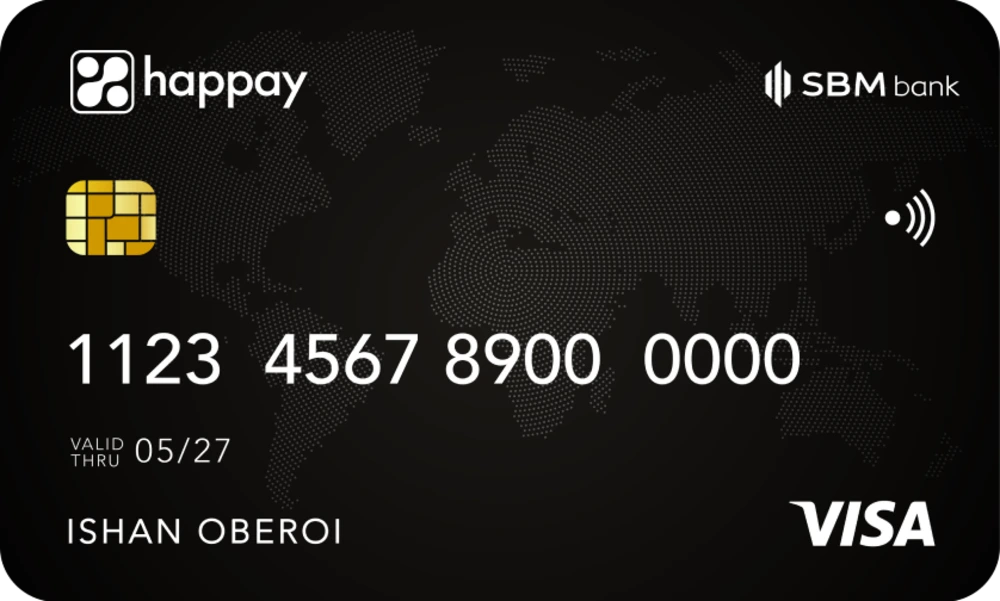

Discussion about this post